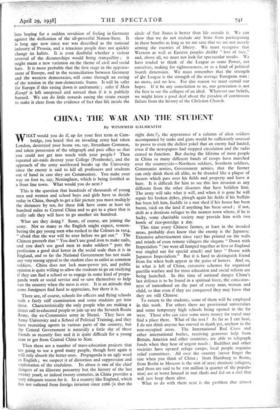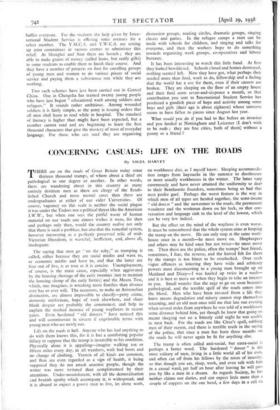CHINA : THE WAR AND THE STUDENT
By WINIFRED GALBRAITH
WHAT would you do if, up for your first term at Cam- bridge, you heard 1 hat an invading army had taken London, destroyed your home on, say, Streatham Common, and taken possession of the telegraph and post office so that you could not get into touch with your people ? Then repeated air-raids destroy your College (Pembroke), and the approach of the army northward breaks up the University since the enemy is said to kill all professors and students out of hand in case they are Communists. You make your way on foot to, say, Nottingham, which is being fortified as a front line town. What would you do next ?
This is the question that hundreds of thousands of young men and women and school boys and girls have to decide today in China, though to get a fair picture you must multiply the distances by ten, for these folk have come at least six hundred miles to Central China and to get to a place that is really safe they will have to go another six hundred.
What are they doipg ? Some, of course, are joining the army. Not so many as the English might expect, remem- bering the gay young men who rushed to the Colours in 1914, "afraid that the war will be over before we get out." The Chinese proverb that" You don't use good iron to make nails, and you don't use good men to make soldiers" puts the profession a good deal lower in the social scale than it is in England, and so far the National Government has not made any very strong appeal to the student class to enlist as common soldiers. China does not lack man-power yet, and public opinion is quite willing to allow the students to go on studying if they can find a school or to engage in some kind of propa- ganda work or social service and so save themselves to help run the country when the mess is over. It is an attitude that some foreigners find hard to appreciate, but there it is.
There are, of course, schools for officers and flying schools with a fairly stiff examination and some students get into these. Characteristically the only people who are making a direct call to educated people to join up are the Seventh Route Army, the ex-Communist army in Shensi. They have an Army University and a School of Political Training, and they have recruiting agents in various parts of the country, but the Central Government is naturally a little shy of these friends so recently foes and it is quite difficult for a young man to get from Central China to Sian.
Then there are a number of mass-education projects that are going to use a good many people, though here again it will only absorb the better ones. Propaganda is an ugly word in English; we suspect it of distortion and suppression and exploitation of the credulous. Its abuse is one of the chief dangers of in illiterate peasantry but the history of the last twenty year?, or indeed twenty centuries, in China provides a very adequate reason for it. In a country like England, which has not suffered from foreign invasion-since zo66 (is that the right date ?), the appearance of a column of alien soldiers accompanied by tanks and guns would be sufficiently unusual to prove to even the dullest yokel that an enemy had landed, even if the newspapers had stopped circulation and the radio ceased to function. But during the lifetime of most people in China so many different bands of troops have marched over the countryside—Northern soldiers, Southern soldiers, Communist armies, Government armies, that the farmer can only think them all alike, to be dreaded like a plague of locusts which pass over his fields and property and leave it bare. It is difficult for him to see this last invasion as any different from the other disasters that have befallen him. The army will take what it will, and when it is gone he will repair his broken dykes, plough again his fields if his buffalo has been left him, huddle in a mat shed if his house has been burnt, stick on the land if anything has been saved ; if not, drift as a destitute refugee to the nearest town where, if he is lucky, some charitable society may provide him with two bowls of rice-porridge a day.
This time every Chinese farmer, at least in the invaded areas, probably does know that the enemy is the Japanese. Extensive advertisement since 1927 has printed on the walls and minds of even remote villagers the slogans "Down with Imperialists "(we were all lumped together at first or England was singled out for special attack) and later " Down with Japanese Imperialism." But it is hard to distinguish friend from foe when both appear in the guise of looters. And so, in what is left of China, extensive schemes for organised guerilla warfare and for mass education and social reform are being launched. In this time of national danger China's last defence is to be found in a spiritual force, the conscious- ness of nationhood on the part of every man, woman and child, so that even if they are conquered they may know that they are still Chinese.
To return to the students, some of them will be employed in this work. For others there are provisional universities and some temporary high schools being opened in the far west. Those who can raise some more money for travel may find a place there. What of the rest ? As far as I can hear, I do not think anyone has starved to death yet, anyhow in the non-occupied areas. The International Red Cross and other international bodies, receiving generous help from Britain, America and other countries, are able to telegraph funds when they hear of urgent needs ; Buddhist and other societies have opened refuge camps, local people organise relief committees. All over the country (never forget the size when you think of China ; from Hamburg to Rome, from Berlin to Moscow is the sort of area) destitute refugees, and there are said to be too million (a quarter of the popula- tion) are at worst housed in mat sheds and fed on a diet that will just keep them alive.
What to do with them next is the problem that almost baffles everyone. For the students the help given by Inter- national Student Service is offering some avenues for a select number. The Y.M.C.A. and Y.W.C.A. are setting up joint committees in various centres to administer this relief. At Shanghai and Sian there are hostels ; they are able to make grants of money (called loans, but really gifts)• to some students to enable them to finish their course. And they have a number of projects on foot for enrolling groups of young men and women to do various pieces of social service and paying them a subsistence rate while they are working.
Two such schemes have just been carried out in Central China. One in Changsha has trained twenty young people who have just begun "educational work among soldiers and refugees." It sounds rather ambitious. Among wounded soldiers it is fairly simple, as the army is issuing orders that all men shall learn to read while in hospital. The standard of literacy is higher than might have been expected, but a number cannot read and are beginning to learn the first thousand characters that give the mastery of most of everyday language. For those who can read they are organising discussion groups, reading circles, dramatic groups, singing classes and games. In the refugee camps a start can be made with schools for children, and singing and talks for everyone, and then the workers hope to do something towards organising work groups, co-operatives and labour bureaux.
It has been interesting to watch this little band. At first they looked bewildered. Schools closed and homes destroyed, nothing seemed left. Now they have got, what perhaps they needed more than food, work to do, fellowship and a feeling that the world has a use for them, even if their careers are broken. They are sleeping on the floor of an empty house and their food costs seven-and-sixpence a month, so that contribution you sent to Yntemational Student Service has produced a goodish piece of hope and activity among some boys and girls (their age is about eighteen) whose universe seems to have fallen to pieces since August last year.
What would you do if you had to flee before an invasion and you landed at Nottingham and Leicester (I don't wish to be rude ; they are fine cities, both of them) without a penny or a friend ?



























































 Previous page
Previous page